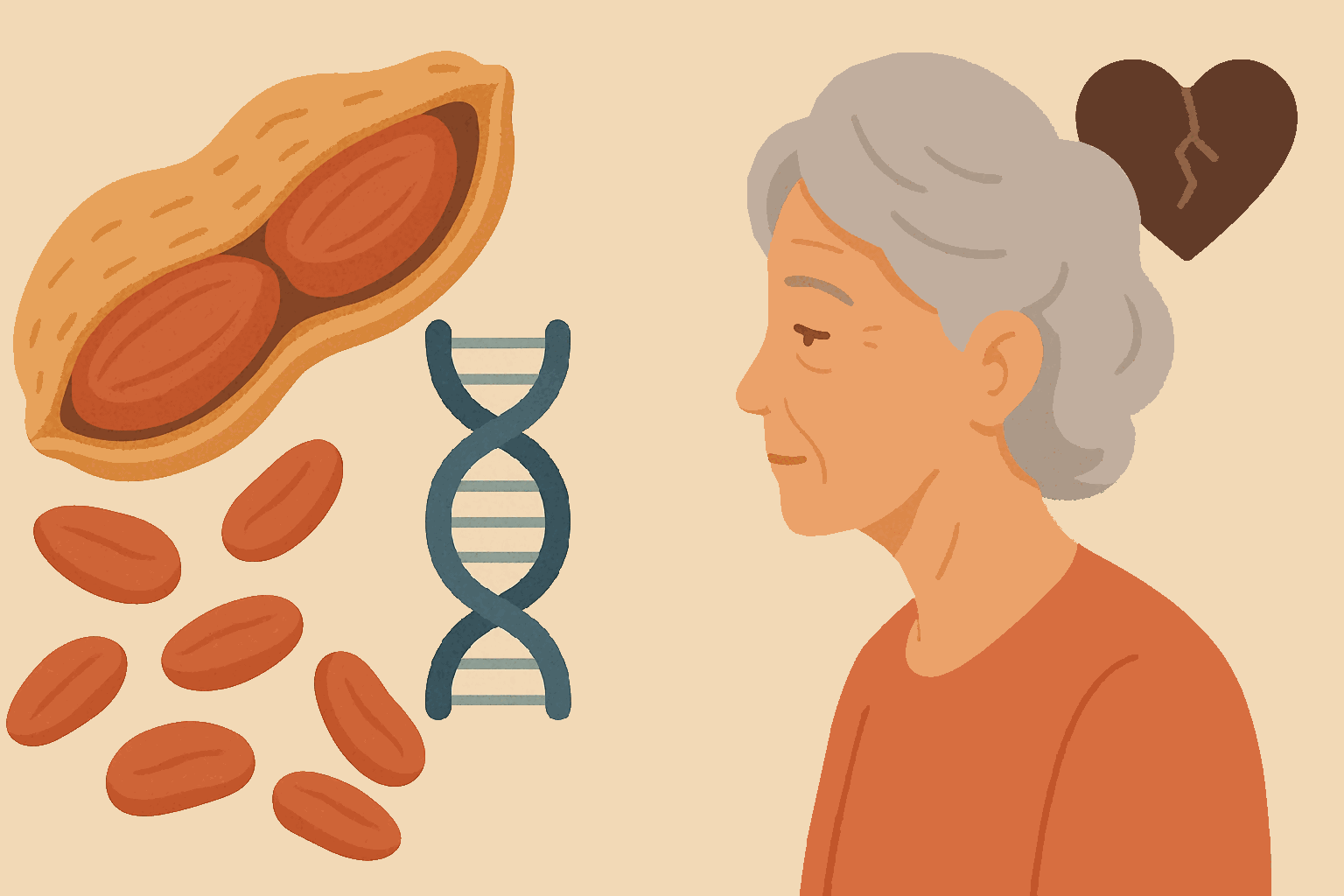
Peanut Health Benefits: Impact on Telomeres, Aging, and Chronic Disease Risk
Table of Contents
Peanut Health Benefits: Impact on Telomeres, Aging, and Chronic Disease Risk
Peanuts (Arachis hypogaea), often enjoyed as a popular snack, are legumes packed with nutrients that offer significant peanut health benefits. The scientific community is increasingly interested in how these humble legumes impact human health, particularly concerning aging, telomere length, and the prevention of chronic disease.
Understanding Peanut Nutrition and Bioactive Compounds
Why are peanuts considered healthy? Their impressive peanut nutrition profile provides the answer. Whole peanuts are a rich source of monounsaturated fatty acids (MUFAs), especially oleic acid, known for its heart-healthy properties. They also contain essential vitamin E, B vitamins, and dietary fiber.
Furthermore, peanuts contain potent bioactive phenolic compounds, including resveratrol and p-coumaric acid. These compounds possess significant antioxidant and anti-inflammatory properties, contributing to the overall health benefits of peanuts.
Peanuts and Telomere Length: Evidence from Clinical Research
One exciting area of research focuses on peanuts and telomeres. Telomeres are protective caps on the ends of our chromosomes, and their shortening is a key marker of cellular aging. Maintaining telomere length is linked to longevity and slower aging processes.
Intriguingly, results from the ARISTOTLE Randomized Controlled Trial (RCT) demonstrated that daily consumption of 25 grams of roasted peanuts (with skins) for six months helped participants maintain their telomere length. This suggests peanuts could play a role in anti-aging strategies at a cellular level.
Can Peanuts Help Prevent Chronic Diseases? Insights from Meta-analyses
Beyond aging, regular peanut consumption is linked to reduced risks for several major chronic diseases, according to various meta-analyses. Here’s a breakdown:
- Cardiovascular Health Benefits: Peanuts may lower the risk of heart disease. Studies suggest they contribute by improving cholesterol levels (increasing ‘good’ HDL) and reducing oxidative stress, supporting cardiovascular health.
- Role in Type 2 Diabetes Prevention: Including peanuts in your diet might help manage diabetes risk. Their components can aid in blood sugar stabilization, a crucial factor in preventing type 2 diabetes.
- Potential Links to Cancer Risk Reduction: The anti-inflammatory and antioxidant power of peanuts could contribute to cancer prevention. Research suggests they might help reduce the risk of certain cancers, possibly by modulating chronic inflammation.
- Peanuts and Neurodegenerative Disease Prevention: Emerging evidence points towards a potential role for peanuts in brain health. Regular consumption may offer neuroprotective benefits, potentially lowering the risk of neurodegenerative diseases.
How to Consume Peanuts for Maximum Health Benefits
To reap the most peanut health benefits, focus on whole foods. Choose whole, raw, or roasted peanuts, preferably unsalted and without added sugar. Including the papery skin provides extra antioxidants.
While peanut butter can be part of a healthy diet, processing might slightly alter the nutrient profile. Aim for natural peanut butter with minimal additives. Consuming around 25-30 grams (a small handful) daily is a great way to incorporate this healthy snack.
Conclusion: Integrating Peanuts into a Healthy Lifestyle
Incorporating a moderate serving of whole peanuts into your daily diet is a simple, evidence-based strategy to support overall health. The data strongly suggests significant peanut health benefits, including maintaining telomere length (linked to aging) and reducing the risk factors associated with major chronic diseases. Their rich nutritional profile makes them a valuable addition to a balanced, healthy diet.
Disclaimer
The information provided on BioBrain is intended for educational purposes only and is grounded in science, common sense, and evidence-based medicine. It is not a substitute for professional medical advice, diagnosis, or treatment. Always consult a qualified healthcare provider before making significant changes to your diet, exercise routine, or overall health plan.
Tags :
- Peanuts
- Peanut health benefits
- Telomeres
- Aging
- Longevity
- Anti aging
- Chronic disease
- Cardiovascular health
- Diabetes
- Cancer prevention
- Neuroprotection
- Antioxidants
- Nutrition
- Healthy diet
- Rct
- Healthy snacks